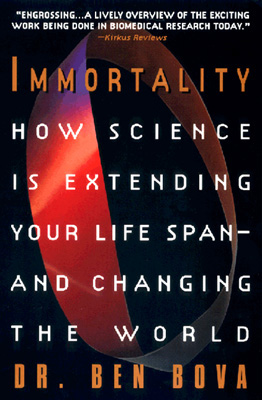

| IMMORTALITY: How Science is Extending Your Life Span — and Changing the World1 Dr. Ben Bova New York: Avon Books, 1998 |
Rating: 5.0 High |
|||
| ISBN 0-380-97518-1 | 283pp. | HC | $24.00 | |
Early in his career, Ben Bova worked for the Avco Everett Research Laboratory near Boston. That laboratory developed one of the first heart pacemakers as well as other medical devices, and gave Bova some of the experience he needed to write this book.
However, as a professional writer with many books (fiction and non-fiction) to his credit, and stints as editor of Analog and Omni, Ben Bova could certainly have researched and written a book on the prospect of immortality without that specific experience. Indeed, so many changes have occurred in biology and medicine since his time at AERL that the subject had to be approached de novo.2 The result is a thoroughly researched and smoothly written introduction to the subject, well-suited for the layman. (Those familiar with molecular biology will want more advanced treatments.) In part one, Bova lays the scientific groundwork for his prediction that immortality — or at least significant life extension — will be within our grasp soon enough that, to quote the Jehovah's Witnesses, "Millions now living will never die." That prospect rests on recent discoveries in biology, most notably the transcription of the human genome and the discovery that chromosomes have end-caps called telomeres that set limits on the number of times our somatic cells can divide.
But there are two schools of thought on the subject. One, which Bova calls the entropists, holds that random damage from free radicals and glucose browning gradually disrupts the functions of the cells, causing them to die. The telomerists, on the other hand, point to the observation that blocking the clocklike action of the telomeres can extend the lifetimes of cells, in some cases rendering them apparently immortal. It is a dispute that may soon be resolved — unless the necessary research is blocked for political reasons.
That is one of three future scenarios Bova discusses in part two of the book. The treatment conferring greatly extended lifespan3 — assuming it is possible — might become available to everyone who wants it. It might be restricted to the wealthy, or to a power elite; or, the fears of religious fundamentalists and other factions could lead to political suppression of the research necessary to achieve it. As Bova points out, such suppression would block most current biomedical research, aborting many promising therapeutic techniques.
As the table of contents makes clear, Bova lays out his discussion in a very logical form. He has obviously interviewed a number of specialists, and delved into many medical journals as well as books and news magazines. His list of references contains 65 citations, and there is an extensive index.
I found not a single typographical error. However, there are some questionable statements.
| Page 122: | "For example, if cancer killed off most human beings before they gave birth to children, the human race would have become extinct long ago." |
| Well, no; if most, rather than all, perish, presumably the survivors would still be able to breed. Also, it's hard to see how this calamity could affect the entire human population in one generation, which is what would have to happen for Bova's statement to be true. |
| Pages 141-2: | "Vitamins A, C and E are well-known antioxidants and can be easily obtained from fruits and vegetables or in larger doses from over-the-counter pills. But while they are of some help in avoiding cancer and heart disease, there is no valid evidence that they slow the aging process, even in megadoses." |
| While Bova does not define "megadoses", its meaning is clear. However, he fails to point out that large doses of Vitamin A can be harmful. |
| Page 149: | "When the ice in frozen cells thaws back to water, the cells tend to swell and burst." |
| I always heard that it was the freezing that caused the cells to swell and burst because — as Bova implies in the previous sentences — water expands when frozen. |
At the beginning of each chapter, there is an "infinity" symbol [∞] at the left of the first word of the test. A vertical line above this symbol extends to the top margin. The problem (for me) is that the vertical line is not centered on the infinity symbol, but points at its right-hand lobe.
Overall, this is a competent summary of the present state of biomedical research into aging. I recommend it as a first book for those new to the topic. Anyone wishing to probe deeper should look to other, more technical books and articles — many of which are listed in the bibliography.

 To contact Chris Winter, send email to this address.
To contact Chris Winter, send email to this address.